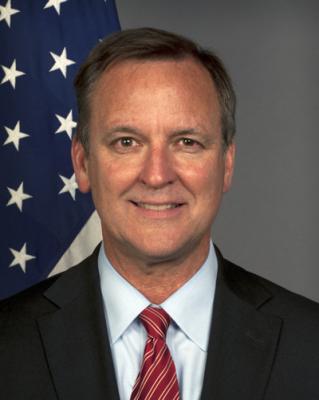US diplomat: FAO "poster child of UN corruption"
ANDREW GARGANO
|
1 October 2013

US Ambassador to the UN agencies in Rome, David J Lane
ROME - The US Ambassador to UN agencies in Rome, David J Lane, has criticised the FAO as a "poster child of UN corruption" at a discussion on the global food crisis.
In his address to a group of multinational students at the American University of Rome, the ambassador discussed the challenges and achievements in food security initiatives. When asked about FAO missions, the ambassador responded that the FAO needs to readjust its focus on rural poverty and likened it to the "poster child of UN corruption."
Ambassador Lane was also critical of the US and European governments. “There is a contradiction in US and European policy," he stated, explaining that policies like the US Farm Bill come "at the expense of small farmers." Granting governmental subsidies for US farms makes it “very hard for poor farmers to compete,” the ambassador stated, concluding that "the US should not be subsidizing its farmers."
However, the focus of the ambassador's speech was not on criticism, but on highlighting his support for other UN initiatives and their progress in combatting poverty. He emphasized that "rates in poverty and child malnourishment have fallen," and contributed Italy as the catalyst for the "renewed emphasis to focus on food security." He also explained that the "strong American tradition of promoting development" has aided in this achievement.
He stated that the ultimate goal of the United States is to move countries away from assistance and that initiatives such as "building schools, updating technology, and helping out small farmers" will result in this “transformational change.” The ambassador also stated that "there is still a lot we need to do." With a rising global population, the need for food assistance increases, and the "levels of investment required cannot be achieved by just government alone." The ambassador explained that "private sector investment is critical" in order to help achieve the goal of feeding the world.
The ambassador’s speech concluded with a message to the young audience. He told the group of students that their generation's ideas have been “unprecedented” because they “understand better.” He told them that they "have a chance to be a part of it," and that their work will allow for a "dramatic change in the levels of poverty.”



pamandkeith
US Ambassador comment on UN Agencies
It is very easy to make negative general comment which smears all effort by the Agencies and their staff but much more difficult to be constructive and encouraging. Shame on the Ambassador. He should know better.